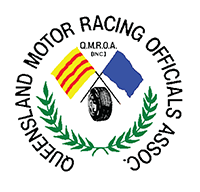About QMROA

Every motor sport event heavily depends on a committed team of marshals and officials, who play a crucial role in ensuring the smooth running of the race.
POINT CHIEF - A Point Chief is an experienced motor racing official who has worked the role of flag marshal and/or communicator. The Point Chief runs the flag point, and helps with the training of inexperienced officials working at their flag point. Point Chiefs are normally not on the radio, so they can be mobile and attend incidents and relay information back to their communicator via hand signals.
COMMUNICATORS - A Communicator is normally second in charge to the Point Chief. Their role is to observe and report to Race Control any activity in their section of track that requires attention. This could be vehicle defects, vehicle stopping in their section, vehicle spins, incidents with vehicle contacting other vehicles or walls etc. & reporting of any drivers that breach the racing rules. This is normally backed up by written reports. Their method of communication is normally on a fixed line usually called a 'loop' system. Alternative communications is by UHF radios. They should also convey all messages from Race Control to all the members of the flag point to keep them informed of what is happening.
FLAG MARSHALS - Flags are the marshals' only means of communication with the competitors. They are used to warn of danger, change in track conditions and if they are about to be overtaken. To do this, a variety of flags are used to keep competitors informed. There are normally 2 flag marshals per point and they normally alternate duties throughout the day. It is important to display the appropriate flags accurately as the competitors should react to these signals and an incorrect signal may cause some confusion. For close to the action excitement, there is very little to match being a motor race flag marshal.
TRACK MARSHALS - The Track Marshals are team members normally under the control of an experienced official, who assist in attending incidents, cleaning the track, carry extra fire extinguishers to the scene for the fire marshals to use if required. In the larger events the Track Marshal works under the control of the Sector Marshal.
FIRE MARSHALS - a position of specialist training to carry out the fire suppression at race meeting and to give competitors the safety necessary at an event. Further details can be obtained from the QFRC website www.qfrc.org.au
SECTOR MARSHALS - A Sector Marshal is a very experienced motor racing official who has been working at the role of Point Chief for a period of time. They are like the supervisor to a number of flag points (about 2 on average) and oversee the sector they are in charge of. They have direct communication with Race Control via UHF radio on a dedicated channel and report on emergency conditions that require immediate attention.
EVENT COMMAND - These are the Senior Team Members, who make sure the that the event is held safely, and within the Regulations.
GRID - These team members are the ones you see walking the GRID and positioning the competitors for starting.
PIT LANE - Control the vehicles in pit lane as well as keeping an eye on the pit crews to make sure they are safe from moving vehicles. Senior Pit Lane officials have radio communication with Race Control and can report any safety issues.
MARSHALLING - Organize the vehicles before they enter the track to make sure all competitors are there and ready to go on time and in the correct order for races.
RECOVERY - Vehicles used to retrieve broken vehicles from the track, and also tow stranded vehicles from sand traps etc.
COURSE CAR - Marshals that drive designated vehicles around the track to perform a variety of tasks including opening/closing the circuit, track observation, report pickups, marshal transportation. This role is highly sought after and not for the faint hearted.
CHASE CAR - Similar to the Course Car, but used mainly for following the race cars for the first lap of a race, so as to be at the scene of an incident quickly that might arise from the first lap when all competing cars are close together. The Chase Car normally has a doctor/paramedic on board to attend an incident that requires medical attention and the chase car may be dispatched from pit lane onto the track while the race is on, in an emergency situation. The course car operator is someone who is very experienced marshal that can advise Race Control of what is required in an emergency situation as well as being able to handle driving a road car at high but safe speeds around the track.

